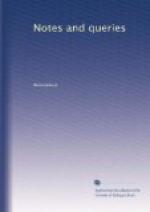Haviour, Haver, Hyfr (No. 15. p. 230, and No. 17. p. 269.).—If I may throw out a question where I cannot give an explanation, I would ask, are we not approaching very near to the word “heifer” (from the Saxon) in these, but especially in the last of the above terms? They seem to me to be identical. The introduction of the sound of y between the sounds of v and ur, is not uncommon in the vernacular or corrupted pronunciation of many words; nay, it is sanctioned by general usage, in “behaviour” from “behave,” “Saviour” from “save,” &c. If the words are identical, still the history of the appropriation of the one to male animals of the class described, and of the other to females, must be curious and worth investigating. May not the aver and averium, like irreplegibilia and other barbarous law terms, be framed (rather than derived) from one of our English terms, as well as from the French avoir?
G.W.
America known to the Ancients.—I have a note of the following references, as illustrating the passage quoted by “C.” (No. 7. p. 107.), and countenancing the idea that the existence of America was at least suspected by the ancients. As I have not had an opportunity of consulting the authorities myself, I cannot tell how far they may affect the point in question; and I fear the references are not as accurate as might be wished, but I shall be truly glad if they prove at all useful:—Diodorus Siculus, Bibl. lib. iv. pp. 299, 300 edit. Rhodoman; Apuleius, De Mund. Oper. vol. ii. p. 122.; Avitus in Senec. Suasor.; Horn, De Origin. Americ. lib. i. c. 10. p. 57.
G. William Skyring.
Error in Meyrick’s Ancient Armour (No. 17. p. 266.).—In the second edition of Meyrick’s Armour, the error pointed out by Mr. Hudson Turner has not been corrected. The passage is, “Item a gamboised coat with a rough surface of gold embroidered on the nap of the cloth;” and with the note, “Like a thicket.”
F.C.B.
Nomade.—The last Indian mails brought me the following derivation of the word Nomade, in a letter from a friend, who was, when he wrote, leading a nomade life among the Ryots of Guzerat:—
“Camp, Kulpore, Jan. 30. 1850.
“The natives use [for their tents] a sort of woollen stuff, about half an inch thick, called ‘numbda.’ * * * * * * By the bye, this word ‘numbda’ is said to be the origin of the word nomade, because the nomade tribes used the same material for their tents. When I was at school, I used to learn nomde, from [Greek: nemo].”
Melanion.
* * * * *
NOTES ON BOOKS, SALES, CATALOGUES, ETC.
A view of the Exhibition of the Works of Ancient and Mediaeval Art has convinced us that fame had done no more than justice to its merits and interest. We dare not attempt to enumerate one tithe of the gems in Glass, Enamel, Metalwork, Carving in Wood and Ivory, Porcelain, &c., now gathered together in the Adelphi to justify the enthusiasm of the antiquary, and to show, in the words of Marlowe,




